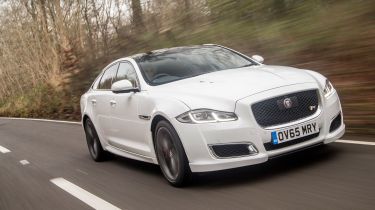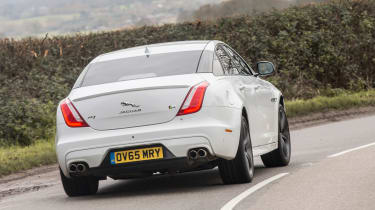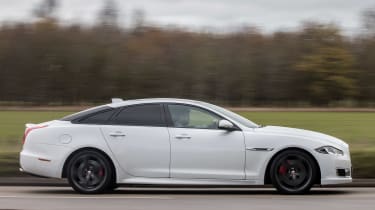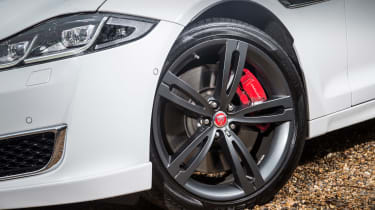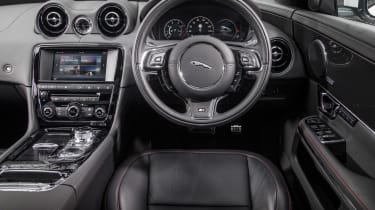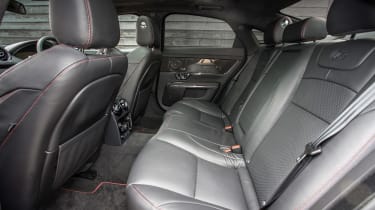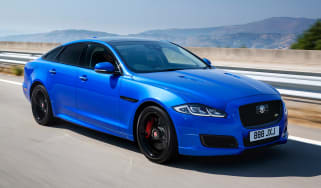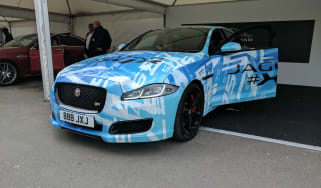Jaguar XJR review
Jaguar XJR offers incredible performance and comfort, rivalling the Mercedes S63 AMG super-saloon
The XJR is one of a small, but high desirable range of hot Jaguars in the UK. The XJR name has been around for 20 years now and has a cult following for offering outrageous supercar performance in a limo package.
In the UK it’s offered only in short-wheelbase trim, but it’s cheaper than the Mercedes S63, weighing in at well under £100,000 - but the Audi S8 trumps both cars with the lowest price of the three super-saloons. Other rivals include the Maserati Quattroporte and Porsche Panamera.
With its sloping roof and coupe-inspired lines, the XJ always appeared well suited to a racy R makeover. Although you can’t ignore the all-round desirability of the Mercedes S63 AMG, the more engaging Jaguar gets the nod in terms of pure thrills. From its burbling V8 soundtrack to its entertaining rear-wheel-drive handling, the XJR feels like a proper sports saloon.
While it can’t match the S-Class for hi-tech kit, soft leather seats and beautiful materials give well finished Jag cabin a cosy, club-class feel.
Facelifts in late 2015 and 2017 brought in slightly tweaked looks, more tech and safety kit and a small improvement in running costs – but you'll still need deep pockets to run one.
Engines, performance and drive
The XJ has always been one of the best-handling luxury limos money can buy. And for the XJR, Jaguar’s engineers stiffened the spring rates by 30 per cent and reworked the adaptive damping. Inspired by the F-Type, the steering calibration has been fine-tuned, too.
More reviews
Car group tests
In-depth reviews
Road tests
Used car tests
As a result, the XJR feels impressively agile for a big car, turning into corners quickly and precisely. The tyres are wider than the regular saloon’s, so there’s plenty of grip, although the sheer amount of power on offer means that, despite the best efforts of the clever electronic differential, the car relies heavily on its traction control on the exit of tight corners.
The Jaguar feels spirited, with a communicative chassis and responsive handling adding to the character. While it doesn’t flatter you like the Mercedes S63 AMG, there’s more feel at your fingertips. The XJR is the faster choice, too. The weight savings of its aluminium construction help it tip the scales at 200kg less than the S63, and the car sprints from 0-60mph in a mere 4.1 seconds – three-tenths faster.
Sharper throttle response makes it feel keener than the Mercedes and, in spite of its 220Nm torque deficit, it just has the edge for in-gear response. The eight-speed automatic transmission kicks down a couple of ratios if you get too eager with the throttle, so it’s best to use the torque by holding the gears and shifting manually.
It all adds up to car that shrinks around you in a way rivals simply don’t. However, the pay-off is a jittery ride and suspension which reacts to surfaces more than some rival models. The Jag’s big 20-inch wheels crash into potholes as well.
Yet this muscle car infusion doesn’t come completely at the expense of comfort. Although the XJR doesn’t isolate road noise as much as we'd like, the exhaust is tuned to deliver a nice growl. Even better, the V8 doesn’t drone on the motorway, and most of the time this model is nearly as relaxing to drive as a diesel-powered XJ.
MPG, CO2 and Running Costs
By choosing the supercharged V8 petrol XJR over the cleaner, cheaper and more efficient diesel XJ, you’re clearly happy to accept increased running costs. Claimed figures are 25.5mpg and 264g/km of CO2 but you should be expecting MPG figures in the high-teens in the real world.
Happily the XJR is cheaper to buy than its nearest rivals like the Mercedes-AMG S63. Both models sit in the highest 35 per cent bracket, but here a top-band earner will pay £3,839 a year less in company car tax than one choosing an S63 – although that’s still a hefty £12,775.
Insurance groups
All XJ models – including the XJR – sit in just one insurance group band – 50 – regardless of engine size or trim level. It's broadly the same as its rivals like the Mercedes S-Class.
Depreciation
The XJR is a rare sight on UK roads which normally means it'll hold onto its value well. However, due to those high running costs, the opposite is true. Our experts have calculated it'll hold onto 38 per cent of its value after three years/36,000 miles. In contrast the Mercedes-AMG S63 holds onto 46 per cent of its value.
Interior, design and technology
The Jaguar XJR manages to look classy and sporty at the same time, with the sharper side sills, carbon fibre rear spoiler and revised front bumper adding just the right amount of athleticism. Bonnet vents and the quad-exhaust set-up hint at the performance on offer, while extra interest comes from the LED running lights and latticework front grille.
However, given that the standard XJ was launched back in 2009, the cabin is beginning to feel a bit old. As you’d expect there’s plenty of leather upholstery and plush trim, but the new S-Class’s superb interior throws the spotlight on the Jag’s dated design. However, it's still stunning to look at especially if ordered with black leather and black wood trim as it contrasts against the chrome trim beautifully.
The TFT dials, touchscreen and switchgear all look old-fashioned, too, (even though post-2015 models get a better TFT instrument cluster) while some of the materials don’t match up to the Mercedes S-Class’ exemplary standards. Even the fit and finish lacks the final polish of the class-leading S-Class.
Still, with smart ice-blue ambient lighting, chrome air vents and plenty of equipment as standard, there’s still much to like about the XJR’s interior – especially as the driving position is excellent and the standard sports seats are comfortable.
Sat-nav, stereo and infotainment
From 2015-onwards all XJs, including the XJR, come with the 12.3-inch configurable TFT instrument cluster and InControl Touch Pro infotainment. The latter is a massive step-on from the previous, clunky system and joins the InControl Touch systems in lesser Jag models like the XE.
InControl Touch Pro uses an eight-inch touchscreen in the fascia and is Jag's in-house developed version of BMW's iDrive and Mercedes' COMAND systems. There's a variety of different functions and app available, but the most important is the sat-nav. It has door-to-door route planning and guidance, including public transport options. A companion dmatphone app allows you to plan your route offline and then load it into the system at the start of the journey.
The system also offers a Commute Mode which this learns your daily drive and can automatically offer alternative routes to avoid congestion. The system can also direct you to a parking space when you're near to your destination.
Practicality, comfort and boot space
Driver enjoyment is the priority, but the XJR is still comfortable and spacious. While you can’t buy a long wheelbase car in the UK, and the sloping roofline pinches rear headroom, there’s still room for two adults in the back – although the LWB S63 feels much bigger.
There’s more room up front, plus lots of seat adjustment. Yet the small rear screen restricts visibility, and the touchscreen feels outdated and is difficult to use sometimes. The XJR does feature standard heated and cooled front seats, plus keyless entry and a heated steering wheel, and its 520-litre boot is a decent size and is larger than the Audi S8's.
Reliability and Safety
The XJ feels solidly put together, and has strong safety credentials, too. There are eight airbags as standard, as well as stability control and a pop-up bonnet to protect pedestrians. Post-2015 cars get a raft of new kit including cruise control with queue assist, park assist and traffic sign recognition, however the market-leading S-Class still has the edge in terms of hi-tech safety equipment.
As for the mechanicals all engines are well tried and tested and the eight-speed auto is durable too. The XJR hasn't featured in our Driver Power surveys but the XJ has – it finished an impressive seventh in the 2015 Driver Power Survey and Jaguar dealers finished in second place.
The only real worry would be with some of the electrical systems, which can play up in Range Rovers and a large proportion of the technology is shared.
Warranty
All XJ's come with a three-year warranty which can be upgraded to an extended warranty to cover paint and bodywork. The extended warranty also includes roadside assistance.
Servicing
There are various service plans available and Jaguar now offers an online service so owners can remotely check their car's service history.
